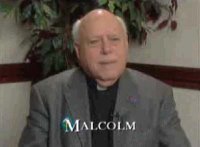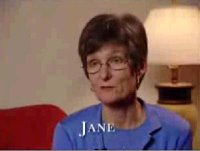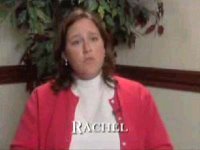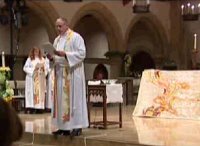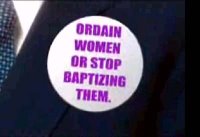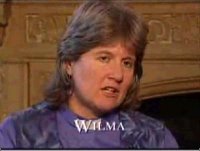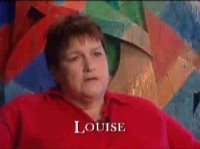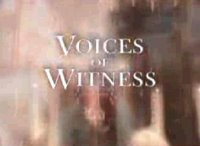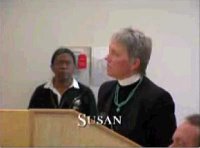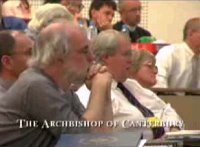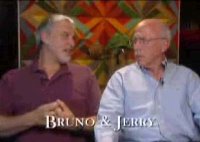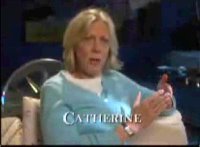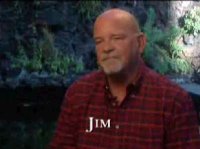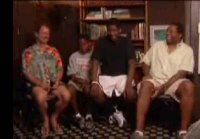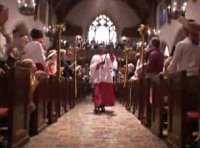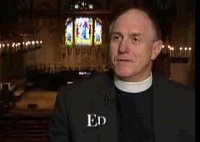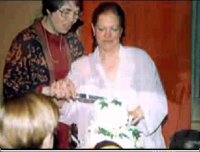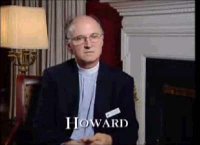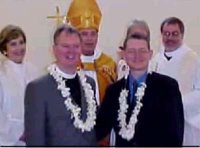More from Diane Rehm's interview with Presiding Bishop Elect Katharine Jefferts Schori. (Click the image above for a new t-shirt design Demetrius made today.) Katharine Jefferts Schori: There are only 9 provinces of the 38 that don't ordain women at all. Several of the others are in process to ordain women to all orders of ministry. But the reality is that women are leaders as baptized persons everywhere in the communion, and they always have been. Diane Rehm: I thought it was interesting to hear that Bishop Desmond Tutu shouted "Whoopee!" when he learned of your selection. He went on to say, "When you think we used to say 'What? A woman doctor?!' 'What? A woman engineer?!' 'What? A woman prime minister?!' And now we have, for the first time, a woman Presiding Bishop Elect of the Episcopal Church. ...there are three diocese in the U.S. that still restrict women's access to the priesthood. Do you expect that to change? Katharine Jefferts Schori: Well, the reality is that it is the bishops of those three dioceses who object to the ordaination of women to the priesthood. There are certainly laypeople and clergy in all of those dioceses who affirm that possibility. One of the interesting pieces of Christian history is that there's very good evidence that in the early church, women did exercise ordained leadership. And when the church began to be enculturated under Constantine, that possibility was removed. Women were slowly excluded from public leaderhip in the church. So we're returning to our roots, in some sense. Diane Rehm: Why do you think they were excluded by the bishop of Constantine? Katharine Jefferts Schori: I think that exclusion happened gradually because it was uncomforable for the culture around the Christian church to see women in public roles. In the Roman tradition it was unusual to see women in public. One might point to similar cultural norms in other parts of the world today, especially in the Islamic world. It's very uncomfortable in some Islamic cultures to see women in public roles. Alternate link for comments |
Thursday, June 29, 2006
KJS+ on the role of women in the church
Posted by
Renee in Ohio
at
11:00 PM
|
![]()
KJS+ on the elevation of Bishop Gene Robinson
More from the interview with Diane Rehm |
Posted by
Renee in Ohio
at
10:06 PM
|
![]()
KJS+ on inclusiveness and diversity
Selected excerpts from Katharine Jefferts Schori's interview with Diane Rehm on NPR today.  ...the House of Bishops and, certainly, by extension, the General Convention, is not unlike what happens in the Pacific Ocean every year. Humpback whales sing songs--you've probably heard recordings of them. Indeed! When they come together--they come together a couple of times a year, one of the places is off the Hawaiian islands. They come together for a time, and while they are together, they learn a new song. Each of their individual songs changes, and they begin to sing a common tune. When they go home again, they teach that song to their neighbors in their home localities, and over the coming months, that song changes again. And the next time they come back together, they learn a new song together. And to me that was an image of what the church in its legislative gatherings might imitate. What can we learn from each other? How can we come to sing a common song? Do you have a song in mind? Katharine Jefferts Schori: Ahh! "The glory of God is evidenced in human beings fully alive, and that means all human beings, and that means alive in all the facets of their being. Alternate link for comments |
Posted by
Renee in Ohio
at
9:28 PM
|
![]()
Katharine Jefferts Shori responds to a caller on NPR
Presiding Bishop Elect Katharine Jefferts Schori was on the Diane Rehm Show on NPR today. I'm going to post some highlights from throughout the interview later this evening, but since I've seen a lot of comments in recent days that interpreted her support of Resolution B033 as a betrayal of GLBT Episcopalians, I thought I'd post this part first. |
Posted by
Renee in Ohio
at
6:47 PM
|
![]()
Wednesday, June 28, 2006
The Gay Agenda
In honor of the many visitors that seem to be finding their way here from conservative blogs, I'd like to share this still from a two-year-old Mark Fiore animation called The Gay Agenda. |
Posted by
Renee in Ohio
at
11:44 PM
|
![]()
Katharine Jefferts Schori on the radio
Thank you to a blogger who responded to a diary of mine at Daily Kos, who shared this:
Alternate link for comments |
Posted by
Renee in Ohio
at
9:30 PM
|
![]()
Anglicanism for Dummies
As I typed that title, I realized that there is probably already a book with that title, or a title very similar. Or maybe an Idiot's Guide to the Anglican Communion. For anyone not familiar with the "Idiot's Guide to--" and the "for Dummies" series of books, they both capitalize on the peoples' desire for an unintimidating introduction to a topic they admittedly know *nothing* about. If you pick up a book with a title like that, you can trust that you will be introduced to the topic, whatever it is, without any assumption on the writer's part that you know *anything* about the subject at hand. Anglicanism’s founding event was a sixteenth-century political fix, engineered by Elizabeth I as a means of avoiding the Reformation-era wars tearing at Europe. Elizabeth’s father, Henry VIII, for reasons of dynastic and connubial ambition, had broken with the Medici Pope Clement VII and declared himself the “Supreme Head in Earth of the Church of England.” Elizabeth’s half sister and predecessor, Bloody Mary, imposed a Roman Catholic restoration upon the kingdom, in the process dispatching some three hundred Protestants to the stake. When Elizabeth ascended to the throne as a Protestant, the realm faced a third religious about-face in a dozen years, and the prospect of civil war was real. Elizabeth’s elegant solution allowed her subjects to believe whatever they wished but insisted upon a uniform worship service.Later in the article, there is a line that sums up Elizabeth's notion as "Believe what you want, just use this book." That is probably a bit of an oversimplification, but not as much of one as that bumper sticker I've seen that reads "God said it, I believe it, that settles it!" And, of course, when people say "God said it", they are talking about what they've read in a book that's undergone more revisions and translations than the Book of Common Prayer. Once I started learning more about the Episcopal Church, the phrase "3-legged stool" would come up from time to time, referring to scripture, tradition, and reason. Click here to read the rest. I have only covered a few basics about the Anglican Communion, but I feel they are helpful things to know about when reading about the Archbishop of Canterbury's "reflections" about a plan that would make some of us "second class" members of the Communion. Alternate link for comments |
Posted by
Renee in Ohio
at
7:04 PM
|
![]()
Tuesday, June 27, 2006
Voices of Witness (part 3)
Part 1 |
Posted by
Renee in Ohio
at
10:17 PM
|
![]()
Voices of Witness (continued)
(Here's a link to the Google video) |
Posted by
Renee in Ohio
at
7:26 AM
|
![]()
Monday, June 26, 2006
Voices of Witness transcript (in progress)
What follows is a transcript (in progress) of the Voices of Witness video that was produced by Claiming the Blessing. |
Posted by
Renee in Ohio
at
4:03 PM
|
![]()
Further thoughts on General Convention
From An Inch at a Time, Katie Sherrod writes, in part, In his address to the joint session of the House of Bishops and the House of Deputies, Frank Griswold tried to anger "the center" by telling them that "the fringes" had manipulated them. He made it clear that the "fringes" included LGBT people who are participating fully in the life and ministry of the church and want to continue to do so. Read the rest here. Luiz Coelho noted the following in a comment at Father Jake Stops the World: Dear Jake+ That same post at FJSTW links to an article in The Guardian that's worth checking out. Alternate link for comments |
Posted by
Renee in Ohio
at
7:24 AM
|
![]()
Sunday, June 25, 2006
General Convention embraces evolution
In other General Convention news, it's worth noting that Resolution A129 passed. Resolved, the House of Deputies concurring, That the 75th General Convention affirm that God is Creator, in accordance with the witness of Scripture and the ancient Creeds of the Church; and be it further, Read the explanation here. And another thank you to jc for creating an appropriate bumper sticker in such a timely manner! Alternate link for comments |
Posted by
Renee in Ohio
at
10:04 PM
|
![]()
The UN Millennium Campaign
These are the Millennium Development Goals 1. Eradicate extreme hunger and poverty. 2. Achieve universal primary education. 3. Promote gender equality and empower women. 4. Reduce child mortality. 5. Improve maternal health. 6. Combat HIV/AIDS, malaria, and other diseases. 7. Ensure environmental sustainability. 8. Develop a global partnership for development. I've added a Millenium Developement Campaign banner to the sidebar at Faithful Ohio. They come with different celebrities on them--the one I chose has Jane Goodall. Click here to get a banner for your own web site or blog. Alternate link for comments |
Posted by
Renee in Ohio
at
9:02 PM
|
![]()
New bumper stickers
I have been asking Demetrius to put the little "The Episcopal Church Welcomes You" sticker on our car, but he never quite got around to it. Now that convention is over, the timing feels a bit odd, since in the end the convention agreed to the continued moratorium on the consecration of "any candidate to the episcopate whose manner of life presents a challenge to the wider church and will lead to further strains on communion." Alternate link for comments |
Posted by
Renee in Ohio
at
4:08 PM
|
![]()
Friday, June 23, 2006
How General Convention ended: acknowledging the hurt
This is a part of one of my posts at Faithful Ohio. Click here to read the whole post, and to share words of compassion, empathy, and support for those who have been hurt by this resolution.
|
Posted by
Renee in Ohio
at
7:14 AM
|
![]()
A woman's place
Thank you, jc, for creating this bumper sticker I suggested earlier today. |
Posted by
Renee in Ohio
at
12:18 AM
|
![]()
Tuesday, June 20, 2006
ECUSA Presiding Bishop: It's a girl!
Bishop Jack Iker of the Diocese of Fort Worth, Texas, read a short statement from the floor of the Episcopal General Convention, asking Archbishop of Canterbury Rowan Williams to put the diocese under the oversight of another Anglican leader. Here's an article from the Episcopal News Service about the new Presiding Bishop Katharine Jefferts Schori. Prior to ordination, she was a visiting assistant professor in the Oregon State University Department of Religious Studies; a visiting scientist at the Oregon State University Department of Oceanography; and an oceanographer with the National Marine Fisheries Service in Seattle. She is also an active, instrument-rated pilot, who has logged more than 500 flight-hours. More about the new Presiding Bishop, and other news about the General Convention here. Alternate link for comments |
Posted by
Renee in Ohio
at
12:34 AM
|
![]()
Monday, June 05, 2006
How to really protect marriage
At least this move to throw a bone to the Republican base is being recognized for what it is, as can be seen in this headline from Yahoo News, as well as the overall tone of the article: US Republican majority uses symbols to woo its base "This fundamental institution is under threat," Senate Republican Majority Leader Bill Frist said of traditional marriage. "Activist courts are usurping the power to define this social institution. And if marriage is redefined for anyone, it is redefined for everyone. The threat is real."Yes, Bill. Be afraid! Be very afraid! After all, as I've already noted, "activist judges were instrumental in changing the definition of marriage back in 1967, and now people of different "races" can freely intermarry. 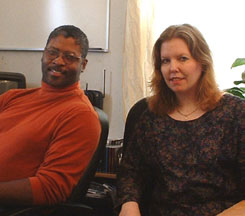 Our numbers are growing--admittedly somewhat slowly--but I think we're making real progress on our ultimate goal of world domination. We've started innocuously enough...quietly challenging people's preconceptions that normal couples must be color-matched. Oh, and of course having the cutest dang kids you've ever seen. But, slowly, gradually, we are changing the face of America to a gorgeous deep, golden tan! Bwahahaha! Perhaps I've said too much... On a more serious note, the sad thing about the current Republican party's idea of "marriage protection" is that it obscures the real threats to marriage and family in this country. As Rev. Dr. C. Welton Gaddy, President of The Interfaith Alliance and member of Clergy for Fairness wrote in a recent op-ed on this issue: We cannot tolerate discrimination being written into the Constitution. So, for those people who want to protect marriage, let me offer a few suggestions: start by raising the public's consciousness of the dignity and importance of women in our still deeply patriarchal society; increase the minimum wage and offer tax breaks to the working poor so that spouses can see each other for quality lengths of time, rather than briefly passing on their way to two jobs; encourage family planning; start a plan to deal with domestic violence; and work to cover mental health care in medical insurance policies so serious emotional difficulties can be prevented from tearing marriages apart. Of course, I think most of us know that the Federal Marriage Protection Amendment is not about protecting marriage in any real sense. It is so obviously "red meat for the base" that headlines like the one I included above seem to be the norm. The most honest response I've seen on this issue to date comes from the woman who answers the phone for Senator Martinez (R-FL)--as reported in a post at Americablog:
|
Posted by
Renee in Ohio
at
7:02 PM
|
![]()








